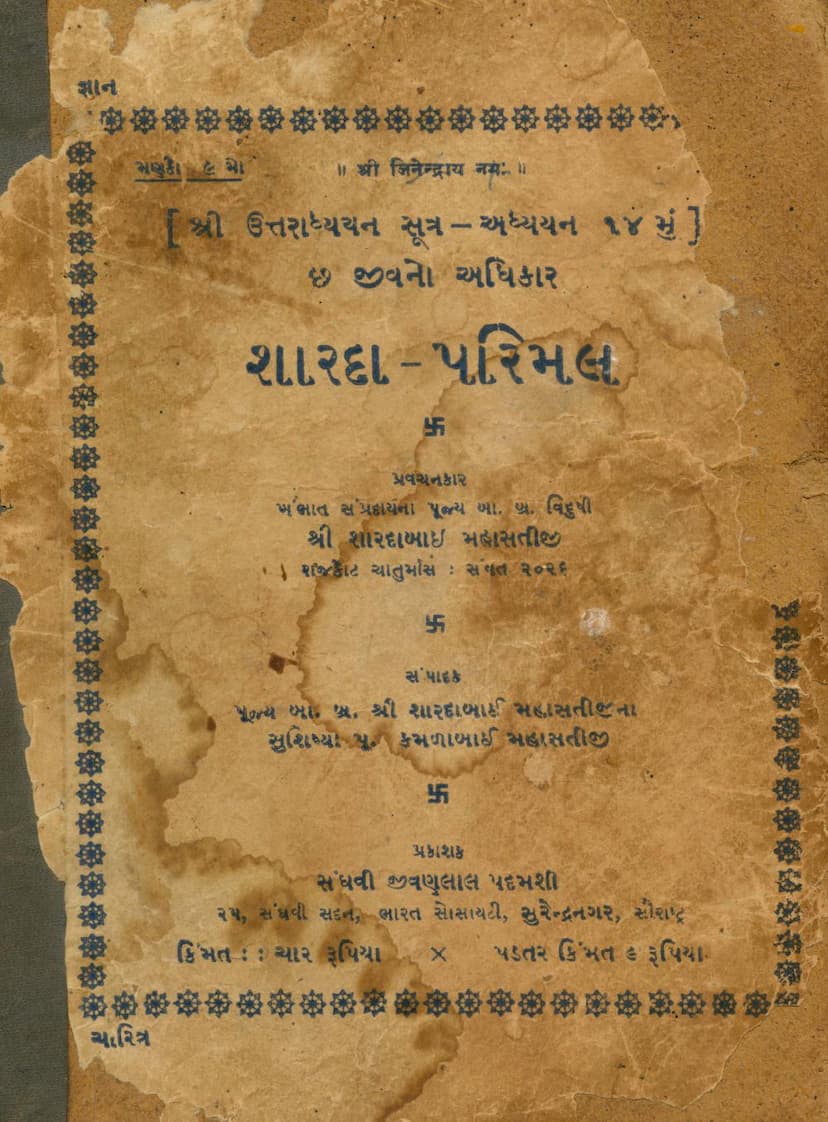Sharda Parimal
Added to library: September 2, 2025

Summary
Here's a comprehensive summary of the Jain text "Sharda Parimal" based on the provided pages:
Book Title: Sharda Parimal (શારદા-પરિમલ) Author(s): Shardabai Mahasati, Kamlabai Mahasati Publisher: Jivanlal Padamshi Sanghvi Catalog Link: https://jainqq.org/explore/023162/1
Core Subject: The text is a collection of discourses (pravachans) delivered by Pujya Ma. Pra. Vidushi Shri Sharadabai Mahasatiji during her Chaturmas in Rajkot in Samvat 2026. These discourses are based on the 14th chapter of the Shri Uttaradhyayan Sutra, specifically focusing on the "Adhikar of Jiva" (जीवना अधिकार). The discourses were compiled and edited by Pujya Kamlabai Mahasatiji, a disciple of Shri Sharadabai Mahasatiji.
Key Themes and Content:
The book aims to explain the profound teachings of Jainism in a way that is accessible to the common person, bridging the gap between spiritual philosophy and daily life. The discourses emphasize:
- The Nature of the World and Suffering: The teachings explore the inherent suffering in the cycle of birth, death, and rebirth (samsara). The text uses analogies like the thermometer to measure the true nature of happiness and suffering in the world, suggesting that the meter for this measurement lies in the "bhava" (state of mind) of knowledge.
- Overcoming Karmic Bonds: A significant portion of the discourses is dedicated to explaining how to break free from strong karmic bonds. This is achieved through practices like tapas (asceticism), tyaga (renunciation), vrata (vows), niyama (discipline), shraddha (faith), and jnana (knowledge). The aim is to simplify the methods for weakening and ultimately severing karmic ties.
- The Illusory Nature of Worldly Happiness: The discourses repeatedly highlight that worldly pleasures and attachments are temporary and ultimately lead to suffering. Analogies like dreams and sandcastles are used to illustrate the ephemeral nature of worldly joys, contrasting them with the eternal bliss found in spiritual pursuits.
- The Importance of the Human Birth: The text underscores the rarity and preciousness of a human birth, especially a Jain human birth, which is considered a unique opportunity for spiritual liberation. It emphasizes the hardship faced by even celestial beings to attain this form, urging listeners to make the most of it.
- The Path to True Happiness: The core message revolves around finding true and lasting happiness not in external possessions or worldly pleasures but in the inner spiritual realm. This is achieved through self-realization, introspection, and adherence to Jain principles.
- Practical Spirituality: The discourses aim to provide practical guidance for living a spiritual life amidst worldly responsibilities. This includes insights on managing desires, understanding karma, the importance of virtuous conduct, and cultivating detachment.
- Illustrative Examples and Stories: The discourses are enriched with numerous examples, stories, and analogies, such as the story of Lakshmi Chand, the madness of attachment, the wisdom of saints, and the profound impact of virtuous actions. These narratives are used to make complex philosophical concepts relatable and impactful.
- The Significance of the Uttaradhyayan Sutra: The text is centered around the 14th chapter of the Uttaradhyayan Sutra, a fundamental scripture in Jainism, providing deep insights into the nature of the soul and its journey.
- The Role of Virtuous Conduct: The importance of maintaining virtuous conduct, developing equanimity (samata), and cultivating compassion for all living beings is consistently stressed.
- The Goal of Moksha: Ultimately, the discourses guide the listeners towards the ultimate goal of Jainism – moksha (liberation) from the cycle of birth and death.
Key Figures:
- Shardabai Mahasatiji: The primary speaker whose discourses form the basis of the book. She is described as a scholar and calm sadhvi from the Khambhat sect.
- Kamlabai Mahasatiji: The compiler and editor of the discourses.
- Jivanlal Padamshi Sanghvi: The publisher of the book.
- Manharlal Chimanlal Dami: The author of the preface, who emphasizes the importance of the discourses for practical and social life.
- Swar: Shardabai Mahasati: Honored as the inspiration for the book, the discourses are dedicated to her memory.
- Swar: Padamshi Kanjibhai: The father of the publishing family, who passed away in Samvat 2010. The book is dedicated to him, highlighting his virtuous life, devotion to Jain principles, and the spiritual upbringing he provided to his children. The dedication emphasizes the father's role in instilling religious faith and guiding towards righteous actions.
Overall Message:
"Sharda Parimal" serves as a spiritual guide, offering profound Jain wisdom and practical advice for leading a more meaningful and virtuous life. It encourages introspection, self-discipline, and unwavering faith in the principles of Jainism to achieve ultimate liberation from worldly suffering. The book's intention is to spread the light of dharma amidst the materialistic pursuits of modern life, particularly within Jain families.